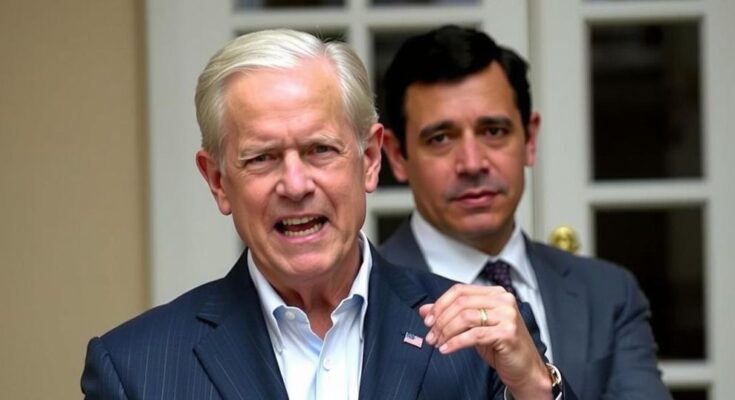President Biden will meet Venezuelan opposition leader Edmundo González at the White House, following González’s recognition as “president-elect” after disputed elections. Amid widespread protests against Maduro’s regime, González is strengthening his campaign for international support, while the U.S. continues to impose sanctions on Maduro’s officials.
President Joe Biden is set to meet with Venezuelan opposition leader Edmundo González at the White House on Monday, as confirmed by a senior administration official. This important engagement follows the Biden administration’s recognition of González as Venezuela’s “president-elect” after the controversial elections held in July 2022. González is asserting that he emerged victorious over President Nicolás Maduro, a claim which contradicts the Maduro government’s dismissal and is fueled by allegations of electoral manipulation following the disputed vote.
The meeting is significant amidst ongoing protests in Venezuela, where citizens are demanding transparency in the election results. Protests erupted due to concerns that the regime under Maduro has rigged the elections, with demonstrators calling for the release of results from each polling station to verify González’s assertions. To strengthen his position and garner international support, González has embarked on a tour across the Americas, which commenced with visits to Argentina and Uruguay. He is urging Venezuelan expatriates to rally outside the Organization of American States to advocate for democratic reforms.
Despite the international dispute surrounding the election, Maduro has been consolidating his power, with the National Assembly inviting him to commence a third presidential term this Friday. This invitation further intensifies the discourse surrounding the legitimacy of the election results, which lack transparency, as detailed counts have not been disclosed publicly. González’s team claims they obtained data from a considerable majority of electronic voting machines, suggesting a significant disparity in votes received between González and Maduro.
In response to the political turmoil, the Biden administration has also imposed sanctions on 21 officials close to Maduro, with the goal of increasing pressure on the regime. These sanctions target key figures in Venezuela’s government accused of repression against dissenters and citizens who contest the election outcomes. Critics of these sanctions argue that despite the attempts to isolate Maduro’s allies, they have not significantly altered the political landscape or resulted in a change of leadership.
In light of the upcoming meeting, there is speculation regarding the topics that will be discussed, but it is anticipated to be a crucial juncture in González’s quest for international validation and his campaign against Maduro’s authoritarian rule. The international community continues to monitor the situation closely, underscoring the global implications of Venezuela’s internal political strife.
The political situation in Venezuela has been fraught with controversy, particularly following the disputed presidential elections in July 2022. The Maduro government is accused of manipulating electoral outcomes, and the legitimacy of its claims to victory has been challenged by various factions within the country and the international community. Among these challengers is Edmundo González, the leader of the main opposition coalition, who claims to have won the election decisively. The United States, under President Biden’s administration, has openly supported González, recognizing him as the rightful president-elect and imposing sanctions on Maduro’s allies to pressure the regime.
The upcoming meeting between President Biden and Edmundo González represents a pivotal moment in international efforts to support democracy in Venezuela. With ongoing protests highlighting the demands for transparency and accountability from the Maduro government, this high-profile engagement may bolster González’s campaign to gain broader recognition and create significant pressure against the current regime. The situation remains dynamic, with implications for both regional stability and international relations.
Original Source: www.newsweek.com




